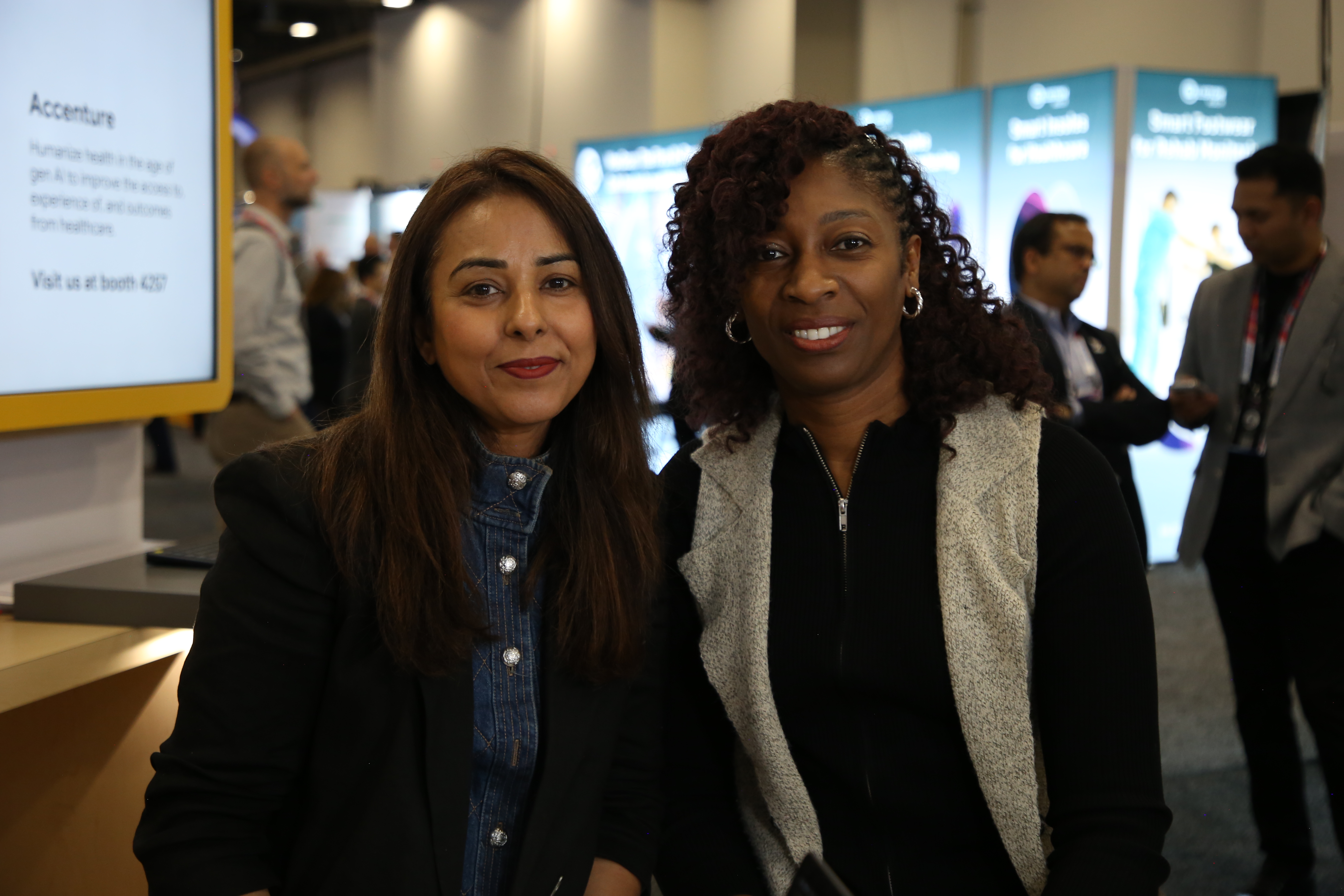 AI
AI
 AI
AI
 AI
AI
AI in healthcare is reshaping the industry by tackling administrative burdens and enhancing patient care. As organizations navigate the rapid evolution of artificial intelligence, success depends on trust, governance and ethical implementation.
For AI in healthcare to reach its full potential, organizations must first establish strong foundational elements, according to Aashima Gupta (pictured, left), global director of healthcare solutions at Google Cloud.

Accenture’s Nneka Emegwa and Google Cloud’s Aashima Gupta talk with theCUBE about the importance of trust in AI adoption in healthcare, addressing ethical concerns and the future of AI-driven digital agents in transforming emergency room workflow.
“We all have seen in the past two years that [AI models] have come to the mainstream,” she said. “But what we are hearing back from our customers is that it’s not … about having a model. How do you serve those models? Where is the platform approach where [you have the] ability to serve those models, but these models [are] also tripped? How are you going to deploy? How are you going to scale? How are you going to monitor them?”
Gupta and Nneka Emegwa, US health and public services at Accenture PLC, spoke with theCUBE’s Rebecca Knight at theCUBE’s Coverage of Google Cloud at HIMSS25, during an exclusive broadcast on theCUBE, SiliconANGLE Media’s livestreaming studio. They discussed the importance of trust in AI adoption in healthcare, addressing ethical concerns and the future of AI-driven digital agents in transforming emergency room workflow. (* Disclosure below.)
Trust is the cornerstone of AI adoption in healthcare. Without it, even the most sophisticated AI systems will struggle to gain acceptance from healthcare professionals and patients alike, according to Gupta. Establishing AI principles, governance frameworks and rigorous evaluation criteria is key to ensuring AI-driven decisions are reliable and transparent.
“I would say [that I] 100% agree [that] healthcare moves at the speed of trust,” Gupta said. “And that is first, then performance [and] then the cost. I would say, from Google’s perspective, some best practice to share is [that] we established our AI principles back in 2018. For organizations getting into that AI transformation journey, how many of them have the AI principles? How many have the governance processes in place? For us, each project, each product [and] each partnership are then evaluated as a governance framework around that.”
Beyond governance, AI in healthcare can play a role in identifying and mitigating bias in healthcare data, ensuring that AI-driven insights lead to equitable access to care, according to Emegwa. Beyond governance, AI in healthcare can play a role in identifying and mitigating bias in healthcare data, ensuring that AI-driven insights lead to equitable access to care. Continuous evaluation and oversight are essential to this process.
“I would say also that you can use AI to solve AI issues, like the bias and all that,” Emegwa said. “If you think of agentic and the agent, you could also build an agent that does that. Maybe it’s a critic agent that keeps looking at your process, making sure that things are coming out as expected, and then also suggesting [and] recommending improvements to that, too. It’s an ongoing process. It’s not a ‘build once and let it run.’ As things evolve, you have to check your guardrails.”
As AI capabilities advance, the healthcare industry is on the brink of transformative changes, according to Emegwa. One of the most promising developments is the integration of AI-driven digital agents that streamline emergency room workflows and enhance patient care. This capability has the potential to serve as an intelligent digital companion, orchestrating care delivery before patients even arrive at a hospital.
“If you think about AI going beyond just being a tool for automation, but now, it’s your big digital companion, is this system providing this intelligence, the growth of intelligence?” Emegwa said. “If you think about the emergency room of the future, let’s say a patient comes in … driven to the [operating room] by an autonomous vehicle [or] autonomous ambulance to start with. These digital agents are pulling all this information before the patient arrives from their wearables, pulling their healthcare information, correlating all that [and] checking the OR capacity.”
For these innovations to succeed, organizations must move beyond scattered AI experiments and implement enterprise-grade solutions, ensuring a strong foundation for AI adoption, according to Gupta. AI models are powerful tools, but their success depends on the infrastructure that supports them.
“My message is, think platform … enterprise-grade privacy and security are table stakes, especially when you talk agents [and] the orchestration of those agents,” she said. “Enterprise workflows … are deterministic … generative AI is probabilistic. How do you match the two to serve a task? You need a platform to be able to configure all these, and that’s where we shine, and this is what our platform offers.”
Here’s the complete video interview, part of SiliconANGLE’s and theCUBE’s Coverage of Google Cloud at HIMSS25:
(* Disclosure: TheCUBE is a paid media partner for theCUBE’s Coverage of Google Cloud at HIMSS25. Neither Google LLC, the sponsor of theCUBE’s event coverage, nor other sponsors have editorial control over content on theCUBE or SiliconANGLE.)
Support our mission to keep content open and free by engaging with theCUBE community. Join theCUBE’s Alumni Trust Network, where technology leaders connect, share intelligence and create opportunities.
Founded by tech visionaries John Furrier and Dave Vellante, SiliconANGLE Media has built a dynamic ecosystem of industry-leading digital media brands that reach 15+ million elite tech professionals. Our new proprietary theCUBE AI Video Cloud is breaking ground in audience interaction, leveraging theCUBEai.com neural network to help technology companies make data-driven decisions and stay at the forefront of industry conversations.